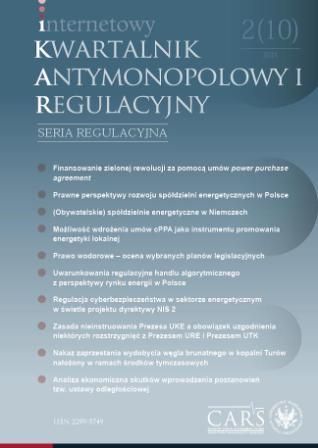Uwarunkowania regulacyjne handlu algorytmicznego z perspektywy rynku energii w Polsce
Regulatory conditions for algorithmic trading (AT) from the perspective of the energy market in Poland
Author(s): Paweł Hawranek, Dariusz Michalski, Daniel BorkowskiSubject(s): Energy and Environmental Studies, Environmental and Energy policy, International relations/trade, Financial Markets, Administrative Law
Published by: Wydawnictwo Naukowe Wydziału Zarządzania Uniwersytetu Warszawskiego
Keywords: algorithmic trading; high frequency trading; power market; energy; renewable energy sources; risk;
Summary/Abstract: The development of the integration of the European energy market and the development of renewable energy sources (RES) contribute to the increased complexity of trade, price volatility and the speed of concluding transactions. This creates both risks and opportunities for companies trading in this market. The complexity of the market is particularly important, both from the perspective of the integration of regional markets in Europe, and the shift of volatility and liquidity to spot and intraday markets. This requires a new approach to trading, where the speed of placing orders and analyzing the emerging trading options, while ensuring risk protection, becomes critical to the success of the trading activity. Algorithmic trading (AT) supports the use of emerging opportunities, making it possible to trade constantly during market hours, considering many different decision variants at the same time, much faster than what traders can do. Moreover, AT also enables simultaneous management of a high number of transactions and more effective position management, because computers can quickly analyze all available data in real time, taking into account the situation in all markets available to AT, considering opportunities, trends and potential risks in energy markets around the world. Computers can immediately generate trades based on these analyzes, generating profits at a speed and frequency impossible to achieve by traders. However, the techniques of algorithmic trading and high-frequency algorithmic trading (HFT) introduce a number of additional regulatory conditions, not only ex ante – requiring the examination of the legal conditions of AT and HFT, but also ex post – regulatory obligations related to transactions concluded within AT and HFT. These conditions are presented in the article.
Journal: internetowy Kwartalnik Antymonopolowy i Regulacyjny (iKAR)
- Issue Year: 10/2021
- Issue No: 2
- Page Range: 73-86
- Page Count: 14
- Language: Polish

